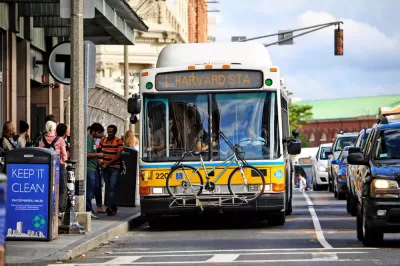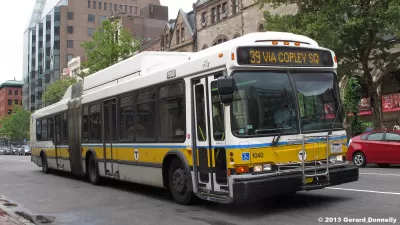The MBTA pilot tested all-door boarding on two bus lines and found that the little-used best practice improved transit service.

The Massachusetts Bay Transportation Authority (MBTA) and BostonBRT recently partnered on a pilot project that brought all-door boarding to Silver Line 4 and 5 from May 24 to June 6, 2017. A post on the MBTA's Data Blog shares the results of the pilot.
According to the MBTA, the goal of the pilot "was to measure how service improved when passengers could board at each door instead of lining up at the front door." And service did improve: "[showing] modest benefits at the median, and very large benefits at the 90th percentile." As expected, boardings with many people benefitted a great deal: "dwell times at stops with 30 or more boardings were cut in half during the pilot, saving roughly one minute each."
The pilot project included an intercept survey to ask passengers about their impression of the Silver Line. Here are the pertinent results from the survey:
In general, SL 4/5 riders are happy with their existing service on a typical day (with 80% of respondents to the survey reporting being at least somewhat satisfied). Satisfaction with the trip during the pilot period was even higher, with 90% of respondents being at least somewhat satisfied. Generally in surveys we see higher satisfaction with a particular trip than with MBTA service overall, but the gap for the Silver Line survey is bigger than we normally see.
After sharing all the good news and positive reviews for the all-door boarding experiment, the post concludes by announcing that the MBTA is "working to implement this change with the procurement of a new fare collection system" and "working with municipal partners and BostonBRT to pilot other aspects of improved bus service."
FULL STORY: ALL-DOOR BOARDING PILOT ON THE SILVER LINE

Planetizen Federal Action Tracker
A weekly monitor of how Trump’s orders and actions are impacting planners and planning in America.

Maui's Vacation Rental Debate Turns Ugly
Verbal attacks, misinformation campaigns and fistfights plague a high-stakes debate to convert thousands of vacation rentals into long-term housing.

Restaurant Patios Were a Pandemic Win — Why Were They so Hard to Keep?
Social distancing requirements and changes in travel patterns prompted cities to pilot new uses for street and sidewalk space. Then it got complicated.

In California Battle of Housing vs. Environment, Housing Just Won
A new state law significantly limits the power of CEQA, an environmental review law that served as a powerful tool for blocking new development.

Boulder Eliminates Parking Minimums Citywide
Officials estimate the cost of building a single underground parking space at up to $100,000.

Orange County, Florida Adopts Largest US “Sprawl Repair” Code
The ‘Orange Code’ seeks to rectify decades of sprawl-inducing, car-oriented development.
Urban Design for Planners 1: Software Tools
This six-course series explores essential urban design concepts using open source software and equips planners with the tools they need to participate fully in the urban design process.
Planning for Universal Design
Learn the tools for implementing Universal Design in planning regulations.
Heyer Gruel & Associates PA
JM Goldson LLC
Custer County Colorado
City of Camden Redevelopment Agency
City of Astoria
Transportation Research & Education Center (TREC) at Portland State University
Jefferson Parish Government
Camden Redevelopment Agency
City of Claremont





























